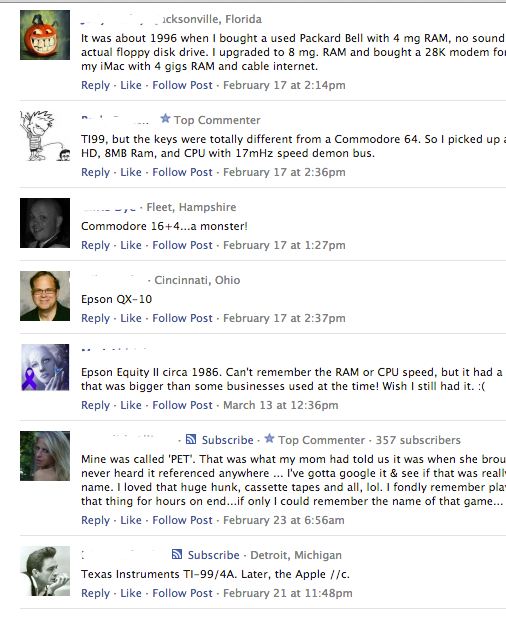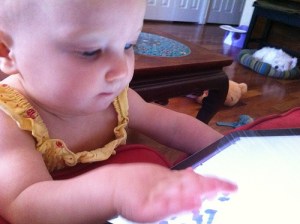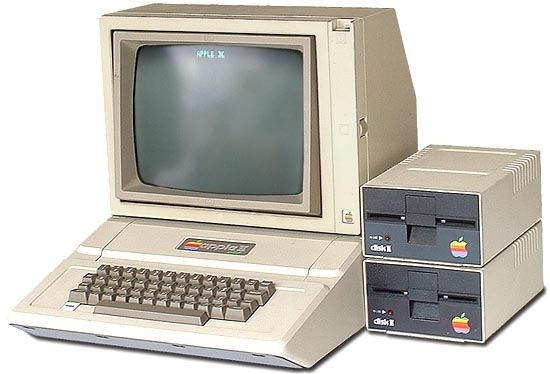Because we just experienced the one-year anniversary of Steve Jobs’ passing, I began to think about how technology has impacted my life and how different it is for today’s children. I thought about my first computer, what computing was like back then and what it’s like now. And it hit me: stories where people recount tales of their first computer will become something only the old people talk about.
Don’t laugh. I’ve been fooling myself for some time that I’m not one of those “old people.” After all, it’s not like I remember punch cards.
I remember the first computer I bought with my own money. It wasn’t a cool Apple II or a colorful iMac. It was a cheap, beige Gateway PC. (Forgive me, I was poor and it was on sale.) It ran Windows 98. And it crashed constantly. In fact, it blue-screened so much that I ended up spending hours on tech support calls, getting walked through restorations, booting into the BIOS, and eventually learning a little about how PCs worked. It changed my life. I realized that computers were interesting, and I wanted to know more about them. I went back to school, and later ended up working in IT for a few years. Somehow, that path brought me here, blogging about tech companies and startups.
 But now the future is rapidly approaching. “First computer?, pfft,” the kids will smirk. I may as well be speaking of my first microwave, my first TV, my first vacuum. It will be mind-boggling to them that technology wasn’t just there, like a toaster oven or air conditioning. They won’t think about the iPad as this thing that came into their life, impacting it, changing what’s possible.
But now the future is rapidly approaching. “First computer?, pfft,” the kids will smirk. I may as well be speaking of my first microwave, my first TV, my first vacuum. It will be mind-boggling to them that technology wasn’t just there, like a toaster oven or air conditioning. They won’t think about the iPad as this thing that came into their life, impacting it, changing what’s possible.
It will be like telling kids that, yes, I grew up without a mobile phone. “That’s so weird,” they’ll say. Kids, I had to remember people’s phone numbers, I tell you. I got lost a lot! Like, crying and alone in-the-middle-of-nowhere lost. I had to rely on the kindness of strangers when I got a flat or ran out of gas. When I went outside to play, my parents had no idea where in the neighborhood I was! I wrote letters from summer camp, and wrote to pen pals. I always had stamps. “What’s a pen pal? Oh my god, you’re sooo old,” the kids will laugh.
Similarly, actually remembering and recounting tales of your first computer will soon be this odd, old-person thing to do, too. Kids’ first computers will be their parents’ hand-me down iPads. There are children being born into the world now who have always had an iPad. Like, from babyhood. I know that you know this already, but really think about that for a minute. To these kids, the iPad wasn’t any newer a thing to them than anything else in the world. It was there, just like air and sunshine, plants and animals, houses and cars, skyscrapers and freeways, boys and girls, dolls and bicycles…TVs and iPads. It’s just another thing.
It’s not particularly special or notable.
It’s not amazingly thin.
It’s not super annoying because it doesn’t have a keyboard or mouse. It’s not weird that you tap and touch it, or tilt it when playing a game. That’s normal. That’s what you do with computers. (“Computers,” of course, being how old people refer to these things.)
Whatever, it’s just an iPad. So what?
I was the first person in my family to get the iPad. I brought it over to my sister-in-law’s on Easter. The family passed it around throughout the day. It was memorable, because it was this shiny, new portable computer with a touchscreen. That alone made it incredible. It had apps! Games! Gestures! I described it then as “the first real family computer,” because it was something everyone could use. I had originally thought the only people who would care about the iPad were my younger nephews. I was wrong. Everyone used it. The kids played games, but so did the grown-ups. Grandma looked at baby pictures. Someone else played cards. Someone watched Netflix. Someone surfed the web. I didn’t get to see it much that day.
 But even then, the most incredible thing about the iPad is that it was somehow both new and normal. It was natural. There wasn’t a lot of training involved. You just picked it up and used it. Here’s how I described it:
But even then, the most incredible thing about the iPad is that it was somehow both new and normal. It was natural. There wasn’t a lot of training involved. You just picked it up and used it. Here’s how I described it:
No longer is computing an isolated experience with one person staring at a screen, fingers clacking away on the keyboard while the rest of the family does something else. The iPad was shared between brothers, giggled over by children, and downright snuggled up with…It was no more isolating an experience than someone reading the paper in the next chair over. It was easily just another everyday object. And that may be its biggest selling point yet: the iPad hides away the technology, and makes content king.
My daughter, three in December, has had an iPad her whole life. There’s something remarkable to me about watching her launch Netflix, browse the queue, start an episode of “Dora the Explorer,” fast forward if need be, and hit “play.” It’s not remarkable to her that she does this, any more so than stacking Legos, or putting on shoes. It’s just another life skill to master.
But I can’t help but marvel. And in marveling, I’m showing my age.
It’s an iPad, mom. So what?
Amazing.
Image credits: BuzzFeed; I’m sorry Josie.
